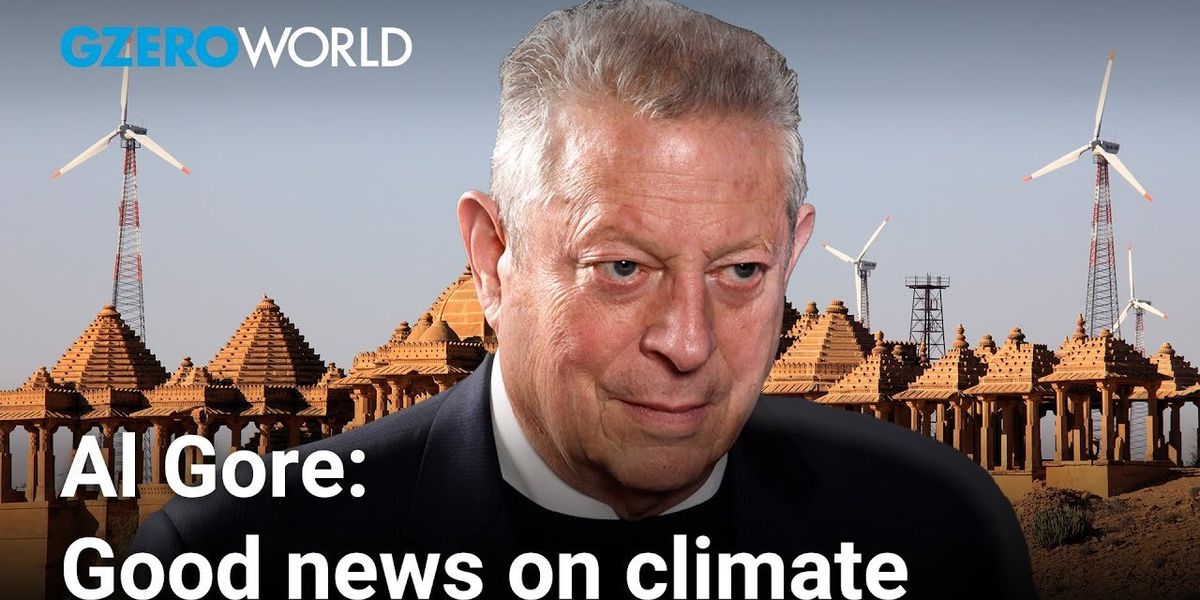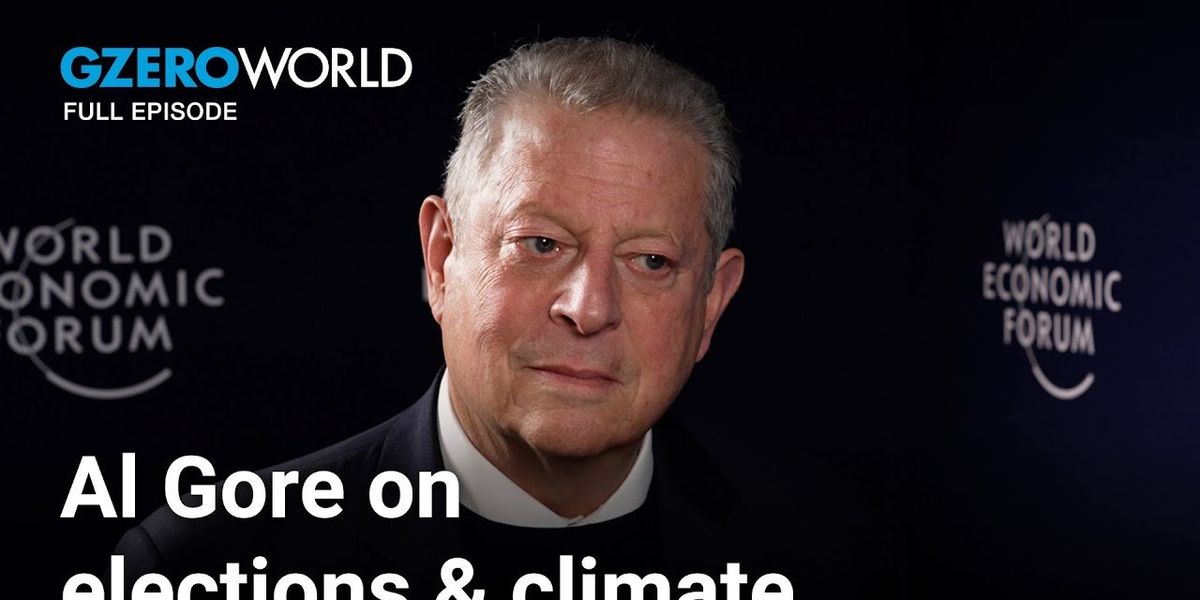Trending Now
We have updated our Privacy Policy and Terms of Use for Eurasia Group and its affiliates, including GZERO Media, to clarify the types of data we collect, how we collect it, how we use data and with whom we share data. By using our website you consent to our Terms and Conditions and Privacy Policy, including the transfer of your personal data to the United States from your country of residence, and our use of cookies described in our Cookie Policy.
{{ subpage.title }}
How political unrest across the West will impact the world: A conversation with UN's Mark Carney
Listen: On this episode of the GZERO World Podcast, major Western democracies like France, the UK, Canada, and the US are on the verge of sweeping political change, but how will upcoming elections impact our collective ability to deal with the world’s biggest challenges like climate, AI, and cyber defense? Mark Carney, former Governor of the Banks of England and Canada and current UN Special Envoy on Climate Action & Finance, joins Ian Bremmer to take a hard look at three of America’s closest allies: France, Britain, and Canada.
Upcoming elections in France and the UK could mean big changes for the West, similar to the aftermath of Brexit. Carney says there are still many aspects of the UK-EU relationship that need to be recalibrated. He also stresses the strategic importance of the US-Canada relationship and Canada’s role as a reliable partner in everything from national security to critical minerals to fighting climate change.
Subscribe to the GZERO World Podcast on Apple Podcasts, Spotify, or your preferred podcast platform, to receive new episodes as soon as they're published.
Al Gore is optimistic about our climate future
Former US Vice President Al Gore is known to many as the Paul Revere of climate change, alerting the world to the dangers of a warming planet and other "inconvenient truths" at a time when only 2/5 Americans were onboard with his message. It earned him a Nobel Peace Prize.
But today, Al Gore has good news to share. In a wide-ranging interview with Ian Bremmer on the sidelines of the World Economic Forum in Davos, Gore is clear-eyed but optimistic about our climate future.
"If we get to true net zero and stop incrementally adding to the amount of heat-trapping gas that's there, the temperatures will stop going up almost immediately with a lag of as little as three to five years. Now, that's new science. It's well-confirmed now. They used to believe that it would keep going even after we reach net zero, but no, it will not. The even better news is that if we stay at true net zero, then half of all the human-caused CO2 and methane will fall out of the atmosphere in as little as a quarter of a century."
Watch the full GZERO World episode: Al Gore on US elections & climate change
Catch GZERO World with Ian Bremmer every week at http://gzeromedia.com/gzeroworld or on US public television. Check local listings.
Al Gore on US elections & climate change
Ian reports from the 54th World Economic Forum in Davos, Switzerland, where the theme this year is “Rebuilding Trust in a Fractured World.” And for sure, confidence in major institutions like governments, churches, and the media is at historic lows. Add to that equation a year that will test democracy like none we’ve seen—as many as 70 elections will take place around the world in 2024. None will be more watched—whether in Davos or Des Moines—than the US presidential election.
Al Gore is no stranger to contested elections, and shares his take on the current state of American politics and some positive news about the progress of climate action. The conversation touches on the most pressing topics at Davos: artificial intelligence, climate change, and deep concerns about the 2024 US election and American democracy.
Catch GZERO World with Ian Bremmer every week at gzeromedia.com/gzeroworld or on US public television. Check local listings.
Al Gore's take on American democracy, climate action, and "artificial insanity"
Listen: In this episode of GZERO World podcast, Ian Bremmer sits down with former US Vice President Al Gore on the sidelines of Davos in Switzerland. Gore, an individual well-versed in navigating contested elections, shared his perspectives on the current landscape of American politics and, naturally, his renowned contributions to climate action.
While the mainstage discussions at the World Economic Forum throughout the week delved into topics such as artificial intelligence, conflicts in Ukraine and the Middle East, and climate change, behind the scenes, much of the discourse was centered on profound concerns about the upcoming 2024 US election and the state of American democracy. The US presidential election presents substantial risks, particularly with Donald Trump on the path to securing the GOP nomination.
Subscribe to the GZERO World Podcast on Apple Podcasts, Spotify, Stitcher, or your preferred podcast platform, to receive new episodes as soon as they're published.
- Podcast: Can the US get its act together? Susan Glasser & Peter Baker on "the world’s greatest geopolitical crisis" ›
- America vs itself: Political scientist Francis Fukuyama on the state of democracy ›
- Divided we fall: Democracy at risk in the US ›
- Francis Fukuyama: Americans should be very worried about failing democracy ›
- Al Gore: "Artificial insanity" threatens democracy ›
- Ian Bremmer: How AI may destroy democracy ›
- Trump's immunity claim: US democracy in crisis ›
Bjorn Lomborg wants to redefine climate change's impact on our lives and economy
Climate change is an urgent problem, but it can be helpful to think about it in the long term because it’s a problem that will be inherited by generations to come.
On GZERO World, Ian Bremmer challenges controversial climate author Bjorn Lomborg on whether his perspective on climate would be different if he were going to live for 200 years instead of the typical 85. But Lomborg holds fast in his belief that though climate change will affect the trajectory of human progress, it won’t lead to the most dire predictions forecast by climate scientists. Instead of searching for a panacea, Lomborg says the world should focus on policies that address climate change in the most cost-effective and efficient ways.
Bremmer challenges Lomborg to think about the potential loss of coastal areas and homelands from rising sea levels, which would lead to a significant shift in how people perceive the future of the planet. But Lomborg is firm in his belief that straight-line thinking is counterproductive. Lomborg predicts we’ll be able to protect most places with advances in technology and that worst-case climate scenarios won’t come to pass.
Catch GZERO World with Ian Bremmer every week at gzeromedia.com/gzeroworld or on US public television. Check local listings.
- Climate change: are we overreacting? ›
- "Climate is a problem, not the end of the world" - Danish author Bjorn Lomborg ›
- Can the world run on green energy yet? Author Bjorn Lomborg argues that's very far off ›
- Podcast: Challenging the climate change narrative with Bjorn Lomborg ›
- Climate change isn’t the most immediate threat to humanity, argues Niall Ferguson ›
- Fix climate change, don't just adapt to its consequences ›
- What Africa has to say about climate change ›
- Climate change trade wars ›
- How China fits into global climate change ›
The Global South is angry and mistrustful - Ian Bremmer
Frustrated with the lack of equitable access to vaccines, economic challenges, and climate change impacts while wealthier countries fail to fulfill their pledges, the Global South is angry and mistrustful, said Ian Bremmer, president of Eurasia Group, during a Global Stage livestream event at UN headquarters in New York on September 22, on the sidelines of the UN General Assembly.
"They feel like their agenda is irrelevant, that they are the takers, not in any way the collaborators or makers on the rule space and how we're going to deal with global governance challenges," Bremmer says.
Its leaders, however, have already started acting to position themselves as key players in the global governance discussions. Before the United Nations General Assembly, dozens of world leaders met for the first-ever Africa Climate Summit in a bid to take agency. They are set to advance the conversation at the COP28 in Dubai next month.
The discussion was moderated by Nicholas Thompson of The Atlantic. It was held by GZERO Media in collaboration with the United Nations, the Complex Risk Analytics Fund, and the Early Warnings for All initiative.
Dive into the conversation to learn about how countries like Brazil and India are shaping the AI space: Can data and AI save lives and make the world safer?
- What Africa has to say about climate change ›
- Ukraine’s war and the non-Western world ›
- The new BRICS expansion and the Global South agenda ›
- Vaccine diplomacy: China in the Global South ›
- AI for all: Leave no one behind, says Microsoft's Brad Smith - GZERO Media ›
- AI is an opportunity to build trust with the Global South: UN's Amandeep Singh Gill - GZERO Media ›
"Climate is a problem, not the end of the world" - Danish author Bjorn Lomborg
How far should the world go to stop climate change? On GZERO World with Ian Bremmer, controversial Danish author Bjorn Lomborg discusses his perspective on climate and how it differs from the global climate narrative.
Lomborg acknowledges that global warming is a genuine problem but argues it’s not an apocalyptic threat. This nuance is important, Lomborg says. Because it allows for a more balanced approach to addressing climate, as opposed to an all-encompassing focus on the issue of lowering carbon emissions.
Because most of the world still runs on fossil fuels, he says, the singular focus on net-zero emissions is inefficient and misguided. Instead, Lomborg advocates for a greater emphasis on green innovation as a more practical way to address climate concerns.
Watch the full interview on GZERO World: Climate change: are we overreacting?
Catch GZERO World with Ian Bremmer every week at gzeromedia.com/gzeroworld or on US public television. Check local listings.
Climate change: are we overreacting?
Climate experts agree that climate change is real and human-caused. But how far should the world go to combat it? Will the worst-case scenarios forecast by climate scientists end up a reality?
On GZERO World with Ian Bremmer, author Bjorn Lomborg says the answer is no. Climate change is indeed a problem, he says, but “it’s not the end of the world.”
We're not talking about ‘we need to double or triple [renewable energy capabilities].’ We need a hundred-fold increase,” Lomborg tells Ian Bremmer. “We are far away from this actually being something that will scale even in rich countries and certainly not in poor countries.”
Lomborg worries that policy priorities are out of whack and billions of dollars are being wasted on incremental climate mitigation when there are so many urgent issues, like education or maternal mortality, where that money could be used more effectively.





